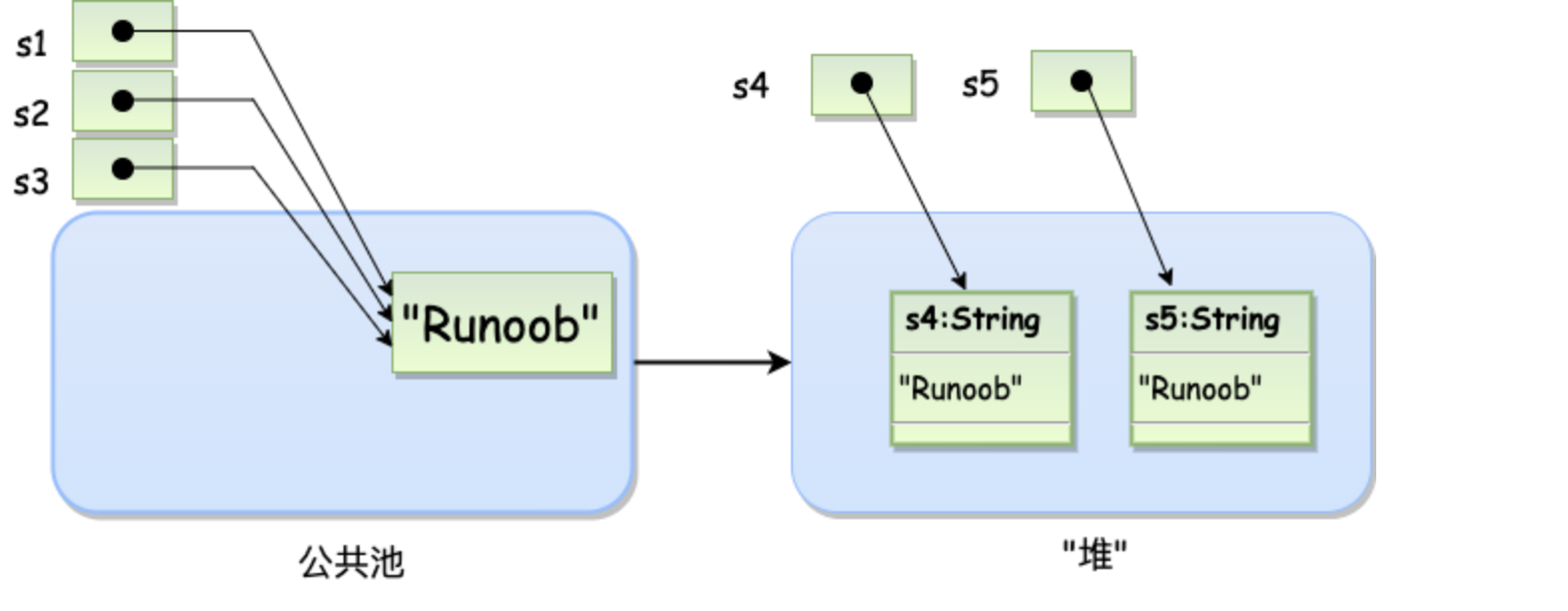可惜一溪风月,莫教踏碎琼瑶。
String 类
- 字符串广泛应用 在 Java 编程中,在 Java 中字符串属于对象,Java 提供了 String 类来创建和操作字符串。
字符串创建
- 普通创建
1 | String str = "Runoob"; |
- 在代码中遇到字符串常量时,这里的值是 “Runoob””,编译器会使用该值创建一个 String 对象。
- 和其它对象一样,可以使用关键字和构造方法来创建 String 对象。
- 构造函数创建
1 | String str2= new String("Runoob"); |
- RuString 创建的字符串存储在公共池中,而 new 创建的字符串对象在堆上
1 | String s1 = "Runoob"; // String 直接创建 |

1 | public class Stringdemo{ |
- 结果
1 | runoob |
- 注意:String 类是不可改变的,所以你一旦创建了 String 对象,那它的值就无法改变了
- 如果需要对字符串做很多修改,那么应该选择使用 StringBuffer & StringBuilder 类。
字符串长度
- 用于获取有关对象的信息的方法称为访问器方法。
- String 类的一个访问器方法是 length() 方法,它返回字符串对象包含的字符数。
1 | public class StringDemo { |
连接字符串
- concat()
1 | string1.concat(string2); |
- 返回 string2 连接 string1 的新字符串。
- 使用加号操作符来连接字符串
1 | "Hello," + " runoob" + "!" |
- 结果
1 | "Hello, runoob!" |
1 | public class StringDemo { |
创建格式化字符串
- 输出格式化数字可以使用 printf() 和 format() 方法。
- String 类使用静态方法 format() 返回一个 String 对象而不是 PrintStream 对象。
- String 类的静态方法 format() 能用来创建可复用的格式化字符串,而不仅仅是用于一次打印输出。
1 | System.out.printf("浮点型变量的值为 " + |
1 | String fs; |
String 类方法
| 方法 | 描述 |
|---|---|
| char charAt(int index) | 返回指定索引处的 char 值。 |
| int compareTo(Object o) | 把这个字符串和另一个对象比较。 |
| int compareTo(String anotherString) | 按字典顺序比较两个字符串。 |
| int compareToIgnoreCase(String str) | 按字典顺序比较两个字符串,不考虑大小写。 |
| String concat(String str) | 将指定字符串连接到此字符串的结尾。 |
| boolean contentEquals(StringBuffer sb) | 仅当字符串与指定的 StringBuffer 有相同顺序的字符返回真。 |
| static String copyValueOf(char[] data) | 返回指定数组中表示该字符序列的 String。 |
| static String copyValueOf(char[] data,int offset, int count) | 返回指定数组中表示该字符序列的 String。 |
| boolean endsWith(String suffix) | 测试该字符串是否以指定的后缀结束。 |
| boolean equals (Objectc anObject) | 将此字符串与指定的对象比较。 |
| boolean equalsIgnoreCase(String anotherString) | 将此 String 与另一个 String 比较,不考虑大小写。 |
| byte[] getBytes() | 使用默认字符集将 String 编码为 byte 序列,并存储到新的 byte 数组中。 |
| byte[] getBytes(String charsetName) | 使用指定的字符集将此 String 编码为 byte 序列,并储存到新的 byte 数组中。 |
| int hashCode() | 返回此字符串的哈希码。 |
| int indexOf(int ch) | 返回指定字符在此字符串中第一次出现处的索引。 |
| int indexOf(int ch, int fromIndex) | 返回在此字符串中第一次出现指定字符处的索引,从指定的索引开始搜索。 |
| int indexOf(String str) | 返回指定子字符串在此字符串中第一次出现处的索引。 |
| int indexOf(String str, int fromIndex) | 返回指定子字符串在此字符串中第一次出现处的索引,从指定的索引开始。 |
| String intern() | 返回字符串对象的规范化表示形式。 |
| int lastIndexOf(int ch) | 返回指定字符在此字符串中最后一次出现处的索引。 |
| int lastIndexOf(int ch, int fromIndex) | 返回指定字符在此字符串中最后一次出现处的索引,从指定的索引处开始进行反向搜索。 |
| int lastIndexOf(String str) | 返回指定子字符串在此字符串中最右边出现处的索引。 |
| int lastIndexOf(String str, int fromIndex) | 返回指定子字符串在此字符串中最后一次出现处的索引,从指定的索引开始反向搜索。 |
| int length() | 返回此字符串的长度。 |
| boolean matches(String regex) | 告知此字符串是否匹配给定的正则表达式。 |
| String replace(char oldChar, char newChar) | 返回一个新的字符串,它是通过用 newChar 替换此字符串中出现的所有 oldChar 得到的。 |
| String replaceAll(String regex, String replacement) | 使用给定的 replacement 替换此字符串所有匹配给定的正则表达式的子字符串。 |
| String replace(char oldChar, char newChar) | 返回一个新的字符串,它是通过用 newChar 替换此字符串中出现的所有 oldChar 得到的。 |
| String replaceAll(String regex, String replacement) | 使用给定的 replacement 替换此字符串所有匹配给定的正则表达式的子字符串。 |
| String replaceFirst(String regex, String replacement) | 使用给定的 replacement 替换此字符串匹配给定的正则表达式的第一个子字符串。 |
| String[] split(String regex) | 根据给定正则表达式的匹配拆分此字符串。 |
| String[] split(String regex, int limit) | 根据匹配给定的正则表达式来拆分此字符串。 |
| boolean startsWith(String prefix) | 测试此字符串是否以指定的前缀开始。 |
| boolean startsWith(String prefix, int toffset) | 测试此字符串从指定索引开始的子字符串是否以指定前缀开始。 |
| CharSequence subSequence(int beginIndex, int endIndex) | 返回一个新的字符序列,它是此序列的一个子序列。 |
| String substring(int beginIndex) | 返回一个新的字符串,它是此字符串的一个子字符串。 |
| String substring(int beginIndex, int endIndex) | 返回一个新字符串,它是此字符串的一个子字符串。 |
| char[] toCharArray() | 将此字符串转换为一个新的字符数组。 |
| String toLowerCase() | 使用默认语言环境的规则将此 String 中的所有字符都转换为小写。 |
| String toLowerCase(Locale locale) | 使用给定 Locale 的规则将此 String 中的所有字符都转换为小写。 |
| String toString() | 返回此对象本身(它已经是一个字符串!)。 |
| String toUpperCase() | 使用默认语言环境的规则将此 String 中的所有字符都转换为大写。 |
| String toUpperCase(Locale locale) | 使用给定 Locale 的规则将此 String 中的所有字符都转换为大写。 |
| String trim() | 返回字符串的副本,忽略前导空白和尾部空白。 |
| static String valueOf(primitive data type x) | 返回给定 data type 类型 x 参数的字符串表示形式。 |
| contains(CharSequence chars) | 判断是否包含指定的字符系列。 |
| isEmpty() | 判断字符串是否为空。 |